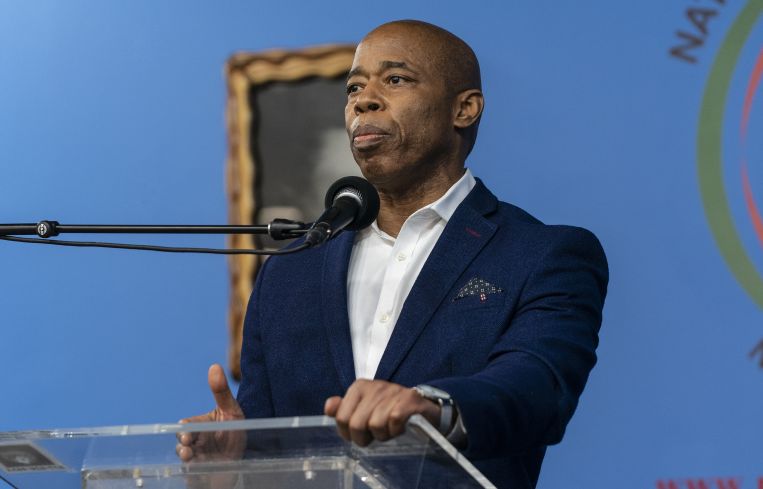The Race to Gracie Mansion: Interview With NYC Mayoral Candidate Eric Adams
By Rebecca Baird-Remba April 29, 2021 8:00 am
reprints
After decades in local politics, Brooklyn Borough President Eric Adams is closer than he has ever been to his goal of becoming New York City’s mayor.
Born in Brownsville, Brooklyn, and raised in nearby Bushwick and South Jamaica, Queens, Adams was beaten by police officers as a teenager after being arrested for trespassing. Despite this traumatic experience, he went on to become a police officer and to found a group called “100 Blacks in Law Enforcement Who Care,” which advocated for criminal justice reform and better relationships between the police and communities of color.
He spent 22 years as a New York City police officer, first as a transit cop and later as an officer at the Sixth Precinct in Greenwich Village, as well as the 94th and 88th precincts in Brooklyn’s Greenpoint and Clinton Hill, respectively.
Following an unsuccessful run for Brooklyn’s 11th congressional district, Adams served seven years in the state Senate, representing a swath of central and eastern Brooklyn before being elected to his current post in 2013.
Since entering the mayoral race last November, the borough president has emerged as one of the frontrunners — after Andrew Yang — and currently has more cash on hand than any other candidate, according to city campaign finance records. And he is arguably the most pro-law-enforcement candidate in the Democratic field for mayor.
Commercial Observer recently reached out to Adams’ campaign to see if he would discuss his housing and land use platform, which advocates for converting hotels and offices to affordable housing, upzoning wealthier neighborhoods to create more residential units, and selling air rights to fund repairs to the city’s beleaguered public housing buildings. Adams responded through a spokesman with written answers to CO’s questions. Here they are, lightly edited for clarity.
Commercial Observer: How does your housing platform differ from the past eight years of Mayor de Blasio’s housing strategy?
Eric Adams: I am going to focus on building more deeply affordable housing, finding the inefficiency in the use of our current affordable housing stock, shoring up [the New York City Housing Authority], and building affordable units in higher-income areas so that lower-income New Yorkers have access to a higher quality of life.
What neighborhoods would you rezone, if any?
There is a large corridor in Manhattan between 14th Street and 42nd Street and Ninth Avenue and Park Avenue with access to mass transit, good schools and a high quality of life that deserves a long look to add new density that will yield affordable apartments.
Would you push to reform the city’s property tax system, which has long been considered outdated by both owners and tenants?
Yes. New York City’s property tax system is fundamentally unfair, allowing wealthy people in Manhattan high-rises to pay significantly less than lower-income and middle-class, single-family homeowners in the outer boroughs. We need to shift the tax burden off renters and homeowners in less affluent areas to the owners of pricey apartments in wealthy areas.
Right now, billionaires are paying a fraction of the property tax rate that working-class folks are, and that’s just wrong.
Many in the real estate industry believe the citywide hotel special permit will be a death knell for new hotel construction in New York City. Do you have a position on the special permit, which would effectively make all new hotel construction subject to City Council approval?
Yes, I support the special permit. We have had far too many hotels go up in the outer boroughs that add nothing to the communities they are in and do not provide fair wages for their employees. There needs to be much more scrutiny of development like that. Communities and stakeholders should have a say in where and how hotels are built in this city. There needs to be a process in place to ensure that hotels that are built consider the interests of residents, tourists, and workers.
What steps would you take to address the city’s homelessness crisis? How would you grapple with the current shortage of shelter beds and many neighborhoods’ resistance to shelter construction and conversions?
As borough president, I have supported the equitable placement of shelters. But the long-term solution is not to build more shelters, it’s to build more supportive housing and affordable housing. The vast majority of people in shelters right now just need a more affordable place to live.
Meanwhile, there is vacant affordable housing that families could live in, as well as empty hotels that could be converted to residential and [single-room occupancies] that could be built for homeless individuals.
If elected, how would you change the mandatory inclusionary housing (MIH) policy? Or would you keep it the same?
I think most new developments through rezonings should have some amount of affordable housing, although the idea of mandating it across the board has had mixed results. My approach will be to apply MIH to developments in higher-income areas where the desire to build will be strong, even with a significant portion of the building set aside as affordable.
New York City has long struggled to finance and build enough housing for low-income New Yorkers. How would your housing strategy address that problem?
We need to focus more on options that will create affordable units, but do not require more subsidy — such as small, cheaper micro-units that are common today around the world, but not in New York; SROs; and legal basement apartments and accessory units. We can also spend less on the capital side by converting existing buildings instead of building from scratch, such as converting hotels and commercial buildings to affordable housing.



